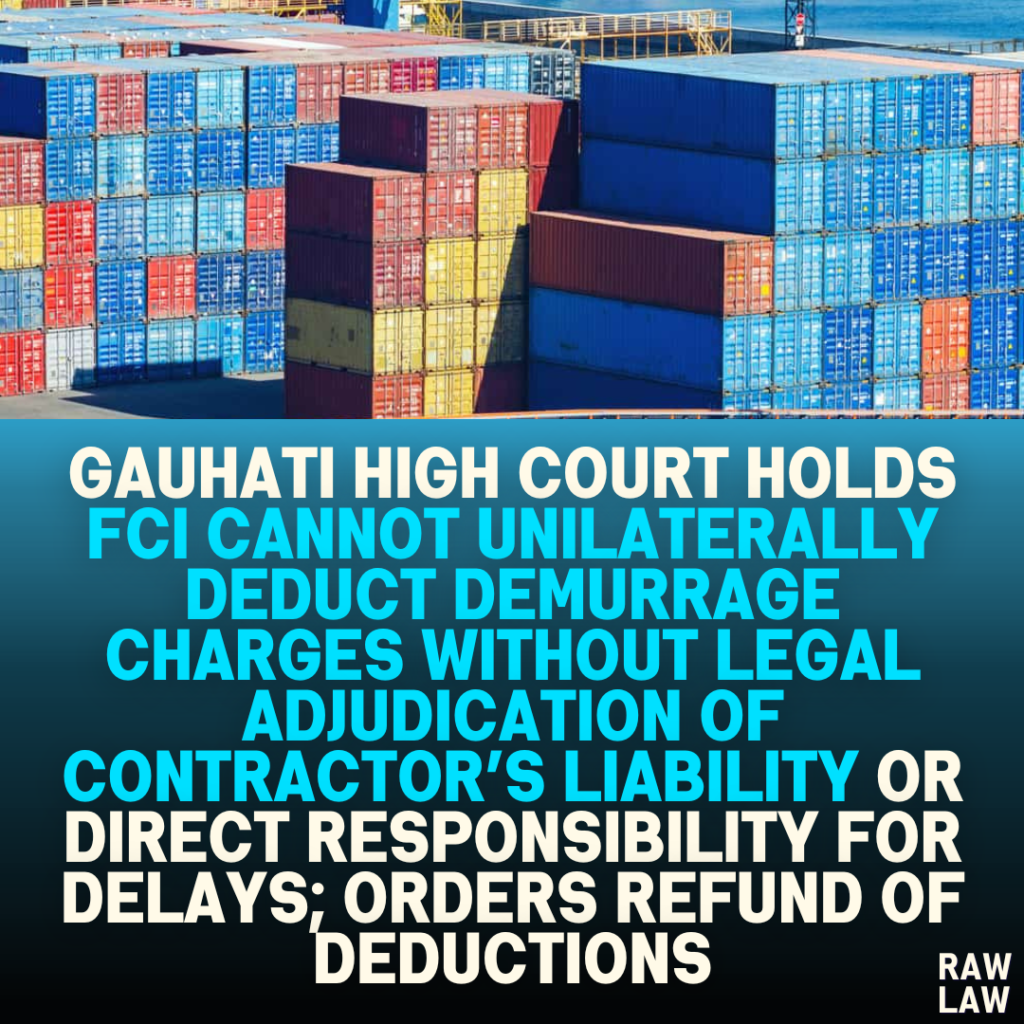Court’s Decision
The Gauhati High Court dismissed the appeal by the Food Corporation of India (FCI), affirming the single judge’s decision that FCI could not unilaterally deduct demurrage charges from the contractor’s running bills without following a due process to establish liability. The court held that unless the liability is determined through a legal process, unilateral deductions cannot be enforced, especially as demurrage charges qualify as unliquidated damages.
Facts
The case arose from a contract between FCI and the respondent, a transport contractor, engaged in transporting goods from a railway siding to a storage facility. FCI imposed demurrage charges on the contractor, citing delays in truck placement for loading and unloading at the railway siding. However, the contractor disputed these charges, asserting that factors beyond their control contributed to the delays. FCI deducted demurrage charges from the contractor’s bills without prior notice or detailed justification.
Issues
- Whether FCI could unilaterally impose demurrage charges on the contractor without a due process to establish liability.
- Whether the contractor, being a transport provider and not directly responsible for handling tasks, was liable for demurrage.
Petitioner’s Arguments
The appellant, FCI, argued that Clause X of the contract allowed recovery of costs, including demurrage, from the contractor. FCI claimed the contractor’s failure to provide trucks for timely loading and unloading at the railway siding warranted these charges.
Respondent’s Arguments
The contractor contended that the delays stemmed from factors outside their control and that they were neither responsible for the handling tasks nor received a notice prior to the deductions. The contractor argued that the unilateral deductions were unjustified and violated the contractual terms, which did not clearly assign liability for demurrage.
Analysis of the Law
The court reviewed the provisions of the contract, emphasizing that while Clause X allows for cost recovery, it does not expressly impose a clear, quantified liability on transport contractors for handling-associated demurrage. The court also considered the principles of unliquidated damages, which necessitate proper adjudication rather than unilateral imposition.
Precedent Analysis
The court referenced the Supreme Court ruling in Food Corporation of India v. Abhijit Paul, where it was held that transport contractors without loading and unloading obligations cannot be held liable for demurrage without clear contractual stipulations. The court also cited Union of India v. Raman Iron Foundry, affirming that unliquidated damages cannot be treated as debt unless adjudicated.
Court’s Reasoning
The court reasoned that FCI’s deductions lacked proper determination of the contractor’s liability, which must be assessed through a legal or adjudicatory process. The court found FCI’s approach in violation of established contractual and legal principles, as demurrage is an unliquidated damage requiring adjudication, not unilateral deduction.
Conclusion
The High Court upheld the single judge’s decision, directing FCI to refund the deducted amounts unless FCI pursued a legal route to determine liability. The court ordered FCI to refrain from further unilateral deductions on account of demurrage from the contractor’s bills.
Implications
This judgment underscores the importance of following due process in imposing unliquidated damages, setting a precedent for similar contractual disputes involving government entities and contractors.



